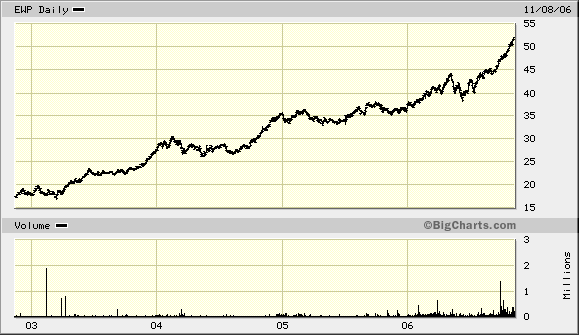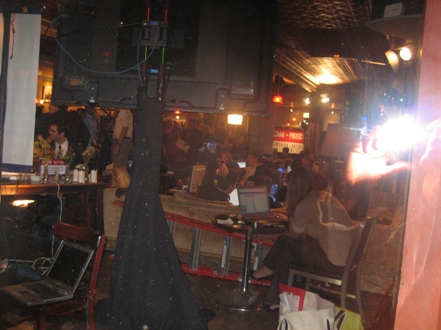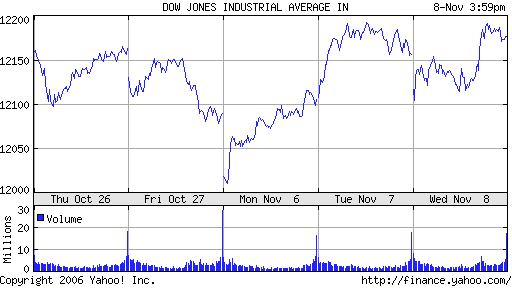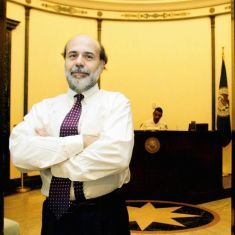Archive for November, 2006
-
Cisco’s Cash
Eddy Elfenbein, November 9th, 2006 at 10:12 amI’m looking at Cisco’s (CSCO) earnings report and I have to say it’s pretty impressive. The shares are up smartly this morning.
But here’s something I don’t get. Why is the company sitting on $20 billion in cash? What’s the purpose? Maybe I’m just missing something but that’s about $3.15 a share. Given all the bad money that Cisco has tossed into share repurchases, why don’t they just give shareholders a big-ass one-time dividend? Giving profits to the owners; isn’t that what business is about? -
Keeping It Real
Eddy Elfenbein, November 9th, 2006 at 6:37 am
This from a recent Investor’s Business Daily story on the coming IPO of KBW, Inc.The boutique investment bank, better known as Keefe, Bruyette & Woods, first filed to go public in the heady market of 1999. It withdrew its plans after its then-chief executive was arrested for passing inside information to his girlfriend.
Girlfriend? Oh, please. Like this was Joanie and Chachi. This is why I get pissed off at the mainstream media. They’re such frickin wimps.
The story would also be correct if it were written like this:It withdrew its plans after its then-chief executive was arrested for passing inside information to his girlfriend, the stripper and porn star Kathryn B. Gannon (aka Marylin Star), pictured above, and star of such titles as Marilyn Whips Wallstreet, Strap-on Sally 11,12, 13 & 14, Marylin Does Miami 1 & 2, Titman and Size Matters. Ms. Gannon also shared her inside information with yet another (let’s say) boyfriend. She then became a fugitive from justice as she fled to her native Canada. Gannon was later arrested, extradited and served three months in prison. One can only imagine it was a steamy, scantily-clad and sexually promiscuous all-female prison.
Now that’s journalism.
-
Guess Where the Hottest Market in the World Is?
Eddy Elfenbein, November 8th, 2006 at 10:12 pm(I’ll give you a hint: Spain).
Give up?
Check the Spanish ETF (EWP):

-
Voter Turnout Reaches All-Time Low Of 17
Eddy Elfenbein, November 8th, 2006 at 3:03 pmFrom The Onion:
NEW YORK—Poll data indicates the 2006 mid-term elections were marked by the lowest turnout ever, with only 17 total votes cast. “Some 24 percent of those who showed up were registered Independents between the ages of 39, 54, 71, and 73, while, surprisingly, less than six percent appeared to be soccer moms driving a green 2000 Plymouth Voyager,” said Harrison Cullers of the Advance Logistics Research Group. “This really shows how much impact a get-out-the-vote campaign that averages $2.5 million per voter can have on the important Milwaukee-resident-Dave-Anderson demographic.” Critics say the low voter turnout was only exacerbated by problems with Diebold electronic voting machines, citing one Ohio district in which a local Democrat received negative 12 votes.
-
The Pelosi Portfolio
Eddy Elfenbein, November 8th, 2006 at 11:06 amCheck out Madame Speaker’s financial disclosure form. It goes on for 20 pages.
-
The Britney/K-Fed Rally
Eddy Elfenbein, November 8th, 2006 at 10:03 amSeptember 24, 2004: Britney Spears marries Kevin Federline. The S&P 500 is at 1110.11.
November 7, 2006: Spears and Federline file for divorce. The S&P 500 is at 1382.84.
Overall, the market gained nearly 25% during their two-year marriage. Thanks kids! -
Gridilocks!
Eddy Elfenbein, November 8th, 2006 at 9:45 amLast night, CNN took over my favorite cybercafe, Tryst in Adams Morgan, to host a gathering of political bloggers. I was just looking for something to drink, but I was barred entry. Here’s what it looked like from the outside.

I did get a chance to meet Scott Johnson of Powerline.
Update: If I told you a big election had taken place in the last five days, could you tell which day it was from this chart?

-
Sector Correlation
Eddy Elfenbein, November 7th, 2006 at 2:42 pmI wrote about this yesterday, but I wanted to follow up today. I mentioned how the energy sector has become the most unglued to the rest of the market. I ran the numbers, and I was right.
Here’s the correlation of each industry group’s daily change to the S&P 500’s daily change:
Financials………………78.74%
Discretionary………….76.27%
Industrials……………..75.75%
Tech……………………..71.32%
Materials……………….63.60%
Staples…………………60.79%
Healthcare…………….58.84%
Utilities…………………38.10%
Telecom………………..38.09%
Energy………………….31.44%
This is important because for a lot of institutional money managers, the name of the game is doing what everyone else isn’t (or can’t). These guys are paid on outperformance, so they hone in on ways to avoid what the broader market is doing. In financial theory, this is related to the concept of the alpha coefficient, as in Seeking Alpha.
Let’s say you run a gazillion dollar hedge fund in Curacao. If everyone is zigging, you want to zag. Face it: Your ability to zag is what you’re all about. Bear in mind, you can own a small number of stocks and closely mimic the market. The number of stocks isn’t that important. You can also own a large number of energy stocks and be completely free of what the averages say. -
Bernanke Warns
Eddy Elfenbein, November 7th, 2006 at 11:50 am
Bernanke warns against protectionist trade policy
Bernanke warns on threat to globalization
Bernanke warns on danger of US deficits
Bernanke Warns of Baby Boomer Retirement
Fed Chairman Bernanke Warns Consumers To Carefully Weigh Options For Home Financing
Greenspan home robbed -
Politics and the Stock Market
Eddy Elfenbein, November 7th, 2006 at 11:45 amMany years ago, Richard Nixon was asked what he’d be doing if he weren’t president. He said that he’d probably be on Wall Street buying stocks. One old-time Wall Streeter chimed in that if Nixon weren’t president, he too would be buying stocks.
I write this as Americans head off to the polls for Election Day. Despite a lot of the commentary you might hear, the effect of partisan politics on the financial markets is very much overrated. Very much. To be sure, it’s there, but it really isn’t much to worry about, and it certainly shouldn’t affect your financial decisions.
Barry Ritholtz posted a study by Ned Davis of how the markets have performed under different parties. This is interesting analysis, but in my opinion, I think they have it backwards. The assumption is that the political parties are like players on the field, and the stock market is the scoreboard. I think it’s just the opposite. The markets are the players; how the politicians behave is the scoreboard. That gets you a more interesting story.
The data shows that the market has done better under Democrats than Republicans. But this is largely due to the influence of the two major crashes happening under Hoover and Nixon. Here’s a though: Maybe it’s not partisan. Perhaps we should just avoid Quaker presidents!
It’s hard to say exactly how much partisanship influences the market. Of course, there’s the moment in U.S. history that’s indelibly marked on the national consciousness. I speak, of course, of 1948 when whatshisface beat that other guy, but the other guy won. The next day, the Dow fell 3.8%. So there you go.
Make no mistake, public policy does influence the markets (and vice versa), but it’s usually in unanticipated ways. It’s usually not the typical Republican/Democratic debate. Instead, it’s usually the kind of things that no one really pays attention to. Sarbanes-Oxley, for example, passed the House 423-3, and the Senate 99-0. It’s the unanticipated things that are so scary, because…well, they’re not anticipated.
Remember that when the new Senate meets in January, only about 10% of the members will be freshman. This isn’t a big change. In fact, our Constitution is designed against big changes. The ratio is the House will go from 8-7 Republican to something like 8-7 Democrat. If your city council did that, no one in town would care.
I’m not saying that voting isn’t important, or that getting involved is a waste of time. I’m simply saying that this has to be put in proportion. Just because people talk about politics at the office or on the subway, doesn’t mean the market cares. The stock market has its own agenda and it’s not up for election.
-
-
Archives
- April 2025
- March 2025
- February 2025
- January 2025
- December 2024
- November 2024
- October 2024
- September 2024
- August 2024
- July 2024
- June 2024
- May 2024
- April 2024
- March 2024
- February 2024
- January 2024
- December 2023
- November 2023
- October 2023
- September 2023
- August 2023
- July 2023
- June 2023
- May 2023
- April 2023
- March 2023
- February 2023
- January 2023
- December 2022
- November 2022
- October 2022
- September 2022
- August 2022
- July 2022
- June 2022
- May 2022
- April 2022
- March 2022
- February 2022
- January 2022
- December 2021
- November 2021
- October 2021
- September 2021
- August 2021
- July 2021
- June 2021
- May 2021
- April 2021
- March 2021
- February 2021
- January 2021
- December 2020
- November 2020
- October 2020
- September 2020
- August 2020
- July 2020
- June 2020
- May 2020
- April 2020
- March 2020
- February 2020
- January 2020
- December 2019
- November 2019
- October 2019
- September 2019
- August 2019
- July 2019
- June 2019
- May 2019
- April 2019
- March 2019
- February 2019
- January 2019
- December 2018
- November 2018
- October 2018
- September 2018
- August 2018
- July 2018
- June 2018
- May 2018
- April 2018
- March 2018
- February 2018
- January 2018
- December 2017
- November 2017
- October 2017
- September 2017
- August 2017
- July 2017
- June 2017
- May 2017
- April 2017
- March 2017
- February 2017
- January 2017
- December 2016
- November 2016
- October 2016
- September 2016
- August 2016
- July 2016
- June 2016
- May 2016
- April 2016
- March 2016
- February 2016
- January 2016
- December 2015
- November 2015
- October 2015
- September 2015
- August 2015
- July 2015
- June 2015
- May 2015
- April 2015
- March 2015
- February 2015
- January 2015
- December 2014
- November 2014
- October 2014
- September 2014
- August 2014
- July 2014
- June 2014
- May 2014
- April 2014
- March 2014
- February 2014
- January 2014
- December 2013
- November 2013
- October 2013
- September 2013
- August 2013
- July 2013
- June 2013
- May 2013
- April 2013
- March 2013
- February 2013
- January 2013
- December 2012
- November 2012
- October 2012
- September 2012
- August 2012
- July 2012
- June 2012
- May 2012
- April 2012
- March 2012
- February 2012
- January 2012
- December 2011
- November 2011
- October 2011
- September 2011
- August 2011
- July 2011
- June 2011
- May 2011
- April 2011
- March 2011
- February 2011
- January 2011
- December 2010
- November 2010
- October 2010
- September 2010
- August 2010
- July 2010
- June 2010
- May 2010
- April 2010
- March 2010
- February 2010
- January 2010
- December 2009
- November 2009
- October 2009
- September 2009
- August 2009
- July 2009
- June 2009
- May 2009
- April 2009
- March 2009
- February 2009
- January 2009
- December 2008
- November 2008
- October 2008
- September 2008
- August 2008
- July 2008
- June 2008
- May 2008
- April 2008
- March 2008
- February 2008
- January 2008
- December 2007
- November 2007
- October 2007
- September 2007
- August 2007
- July 2007
- June 2007
- May 2007
- April 2007
- March 2007
- February 2007
- January 2007
- December 2006
- November 2006
- October 2006
- September 2006
- August 2006
- July 2006
- June 2006
- May 2006
- April 2006
- March 2006
- February 2006
- January 2006
- December 2005
- November 2005
- October 2005
- September 2005
- August 2005
- July 2005
 Eddy Elfenbein is a Washington, DC-based speaker, portfolio manager and editor of the blog Crossing Wall Street. His
Eddy Elfenbein is a Washington, DC-based speaker, portfolio manager and editor of the blog Crossing Wall Street. His